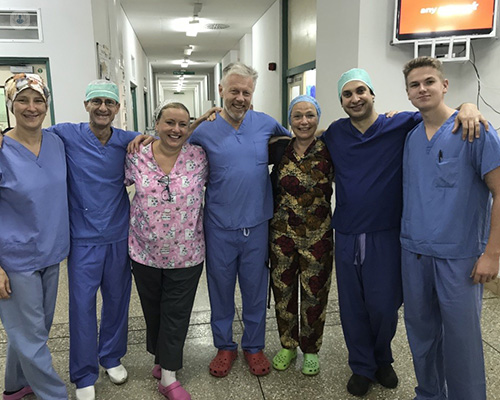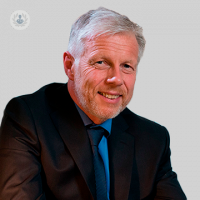Hernia surgery: surgeon Mr Andrew Clarke operates in Ghana
Autore:Leading surgeon Mr Andrew Clarke is a member of a voluntary group called Operation Hernia (OH). Founded in 2005, OH arranges trips for surgeons and other team members to visit and work in deprived areas of Africa to help those suffering with hernias. Mr Clarke’s involvement came as a promise that he had made to a work colleague who had been instrumental in setting up the organisation and who sadly died in a light plane accident in 2010. Mr Clarke undertook the work in his memory and here he shares his experience of his trip to Ghana…

Why are hernias common in African communities?
Hernias are blow out injuries in the abdominal wall. They occur at potential sites of weakness and in men, the groin is as such a common site. In the western world, they are often dealt with as painful reducible swelling and the majority can be corrected through keyhole surgery.
Left untreated in malnourished populations with heavy physical demands, as is seen in Africa, the opening enlarges and the bowel can fall through sometimes leading to sizable groin swellings. This can be severely incapacitating, restricting activity and can have collateral damage to families where the patient is the main breadwinner.
What were the medical resources like in Ghana and how did you support them?
Each team member paid for their own travel. All of the work performed was without financial reward. We took supplies that had been donated to us. The Nuffield Hospital in Bournemouth has been, this year and for previous expeditions, extremely generous. We took toys, skipping ropes and footballs as gifts all donated from schools and other sources.
We visited a town called Ho, a three-hour drive from the capital, Accra. The hospital provided us with three adjacent operating theatres each with a nurse proficient in spinal anaesthesia. The instrument sets were not standardised and contained an array of equipment donated to the hospital. Each was appropriately sterilised and served their purpose. Patients with hernias attended the hospital responding to a radio request. Many travelled a considerable distance. We saw between fifteen and twenty patients each evening in preparation for the following day’s surgery. Patients were marked and consented with the help of an interpreter.
What were the challenges in performing hernia surgery in Ghana?
Our party consisted of three surgeons (and a trainee), two theatre sisters, and a student. We undertook a total of 77 cases in 5 days. All but one case was performed with the patient awake and using spinal anaesthesia. Most had large defects containing small bowel and all were repaired with sterilised pre-cut pieces of mosquito net. Many operations took time as the defects were frequently so large. One patient was converted to a GA as there was so much of the intestine that had slid into a hernia that it couldn’t be returned to the abdomen with the patient awake. The reconstruction of the lower abdominal wall in this particular case took four hours. Overall there was not one complication and all patients were discharged successfully.
What surprised you most on this trip?
Although hard work and dealing with patients with advanced pathology, every person we saw from patients, staff, relatives and the general public were pleased to see is and made us most welcome. The kindness of the people with no material wealth was staggering. Our time was further fulfilled by witnessing the happiness of the children to whom we had brought gifts. We had stories of children sleeping with their new toys, not letting them go.
At the end of our stay, the Medical Director and all his staff arranged to see us to convey their thanks. He told us that all our patients would never forget us and would pray for us every day. I can think of nothing more gratifying than being able to use a skill to provide so much help to fellow human beings and am so grateful for have been provided such an opportunity.


